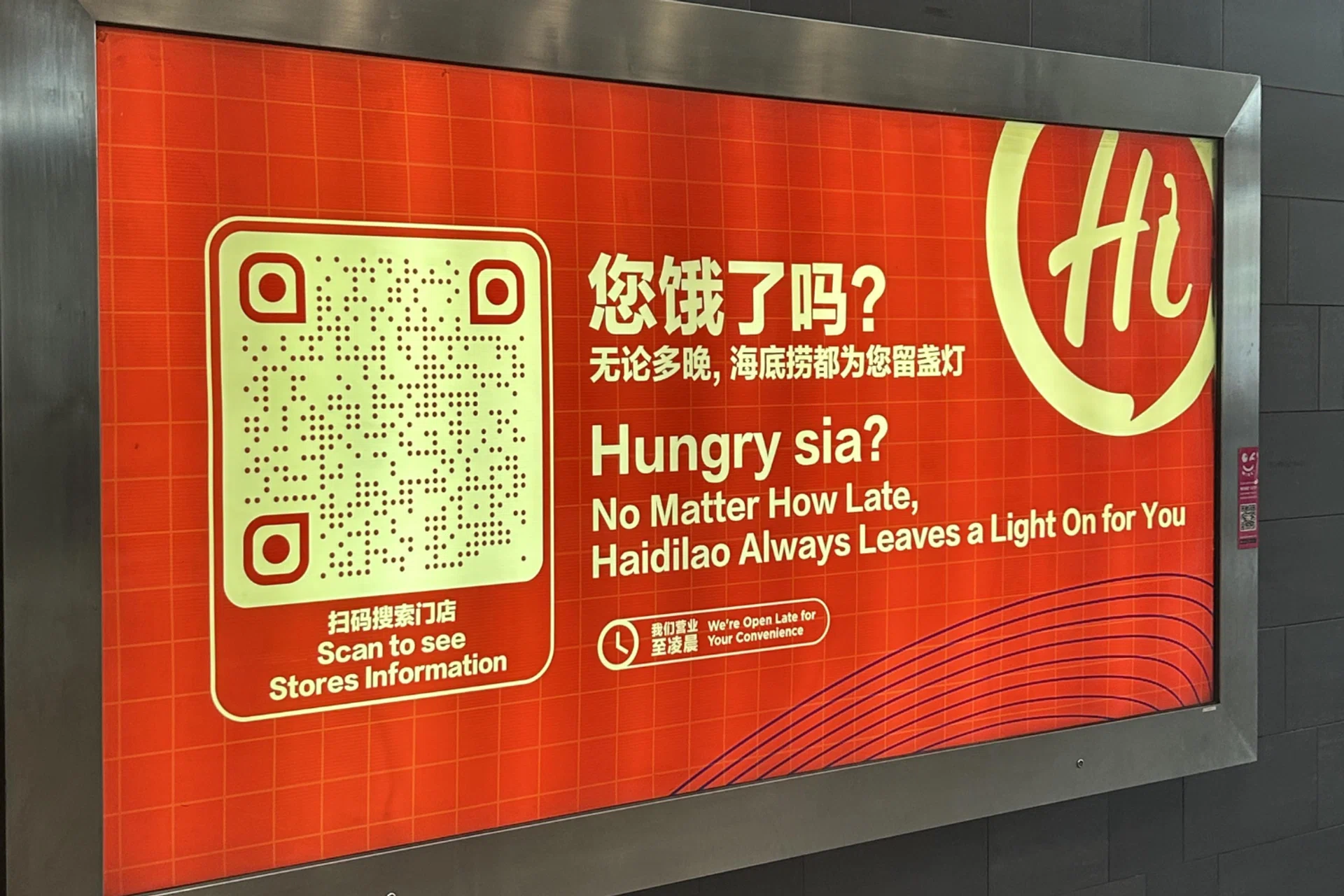'Hungry Sia?': Why are Singaporeans so protective of Singlish?
Experts told The New Paper that reactions to the Haidilao advertisement, which misused Singlish and was slammed by netizens, reflect pride, identity, and the deeper role Singlish plays in everyday life.

Things came to a boil when Chinese hotpot chain Haidilao tried to get cheeky with Singaporeans through its Stadium MRT advertisement.
The advertisement, which features the phrase "Hungry Sia?", was mocked online for its incorrect use of the Singlish particle sia, sparking a wave of grumbles that stretched far beyond the dinner table.
Beneath the negative reactions lies a deeper question: why are Singaporeans so fiercely protective of Singlish, something we were once discouraged from speaking?
In an interview with The New Paper, author and poet Gwee Li Sui, who has written extensively about Singlish, says that's because the language is, quite literally, us.
"Singlish is basically Singaporeans talking with Singaporeans," he says. "If we don't build confidence in this way we communicate, how can we come close to appreciating the ideas and feelings being communicated?"
To him, Singlish is "proof that we are, in our bones, a multicultural people" who were willing to "break the rules of our separate languages and shape a new way of speaking in order to be friends."
When a word hits a nerve
While some netizens saw the Haidilao episode as cultural appropriation, Dr Gwee is more forgiving.
"It's not appropriation if it's an attempt to address the same culture," he says.
"Haidilao isn't claiming that Singlish is its way of speaking; it's just trying to speak as Singaporeans do. So I think we can cut it some slack."
Fellow poet Joshua Ip feels that not every misstep deserves outrage. He asks, "Whenever a foreigner attempts to speak your mother tongue, isn't it the normal reaction to clap politely even if it's bad?"
From his perspective, "Reprobation should be reserved for when the foreigner decides that they will regularly speak in your mother tongue, and still gets it wrong."
What sia really says about us
For Associate Professor Mie Hiramoto of the National University of Singapore, who has studied Singlish for over a decade, the uproar wasn't just about grammar; it was about belonging and the perceived lack of effort on Haidilao's part to consult Singaporeans for the ad.
"Singaporeans are highly savvy," she told TNP. "A lot of people must have thought, hey Haidilao, why didn't you even consult a single Singaporean to check?"
Dr Gwee shares the same opinion, saying, "Strategically, Haidilao did err by not consulting real Singlish speakers - we're more than happy to provide feedback! The failure disappoints, considering that we are the ad's target audience."
While TNP has reached out to Haidilao for clarification on the matter, the restaurant has not responded as of press time.
Prof Hiramoto points out that words like sia are deeply instinctive to locals. These terms are context-dependent, so it can be hard to teach foreigners how to use them in different settings, even though we know these rules by heart.
Being the "most salient" features of Singlish, words like sia are important markers of Singapore identity, which explains the knee-jerk protectiveness or the instinctive 'cringe' when they're misused.
When language mirrors society
"Singlish is recognised as part of local cultural and national identity," says Assistant Professor Luke Lu of Nanyang Technological University's School of Humanities, whose research revolves around interactional sociolinguistics and ethnography.
"When Singlish is 'misused', the general reaction (on the internet anyway) has been one of poking fun at the situation and, at most, mockery. People are mostly aware that such gaffes often stem from lack of exposure to local practices rather than intended with malice," Prof Lu explains.
However, in his view, the online reactions to the Haidilao ad in particular were tied to broader societal issues, namely the "underlying sentiments to do with foreigners and jobs".
That means, he adds, "Singlish became a convenient excuse to air other grievances."
Prof Lu stresses that Singlish and Standard English play "stable and secure" roles side by side - one for everyday connection, the other for formality.
"Academics largely agree we can't eradicate Singlish," he says. "It's an inevitable, organic development of our multilingual [and multicultural] milieu."
Singlish is always evolving, always ours
Like any living language, Singlish continues to evolve.
As Prof Hiramoto notes, even words like jio have shifted in meaning and usage across decades, proving that Singlish adapts just as Singapore does.
And as social media amplifies local voices, Dr Gwee believes it's also amplifying pride. "The most important contribution by social media platforms is that they bring Singlish to the ears of people both domestically and internationally," he says.
"That affirms its distinctiveness, creates interest in it, and strengthens its cultural value."